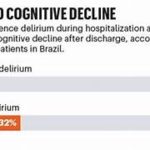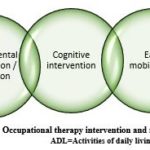Contributed by Thiago J. Avelino-Silva, MD, PhD*; Flávia B. Garcez, MD, PhD* *Faculty of Medicine, University of São Paulo, São Paulo, Brazil Delirium results from an intricate combination of dozens of possible predisposing and precipitating factors1. Older age, functional dependence, and preexisting cognitive impairment are key determinants for its occurrence, but the latter is a […]
Category Archives: Delirium Research
Beyond delirium: The neuropsychiatric dimensions of COVID-19
Contributed by Mark Oldham, MD Assistant Professor – Department of Psychiatry, University of Rochester Medical Center, Rochester, NY The data are clear and, sadly, just as clearly predictable.1,2 COVID-19 has caused delirium—lots of it in fact. Twenty to 30% of older adults with COVID-19 develop delirium, with older adults at higher risk of delirium than […]
Occupational Therapy: Strategies for Delirium Management
Contributed by Evelyn Alvarez1,2,3 & Juan Pablo Saa4 1 Centro de Estudios en Neurociencia Humana y Neuropsicología, Facultad de Psicología, Universidad Diego Portales, Chile, 2 Facultad de Ciencias de la Salud, Universidad Central de Chile, Chile, 3 Departamento de Terapia Ocupacional y Ciencia de la Ocupación, Facultad de Medicina, Universidad de Chile, Chile, 4 Florey […]
Life Changing: Early Delirium Identification and Intervention
Contributed by Kimberly Oosterhouse, PhD, RN, CNE, Loyola University Chicago, NIDUS Pilot Grant Awardee “Kim, I think this is it; she is not responding to me. Can you please come and be with us?” These are the words I woke up to one morning 16 years ago. My distraught grandfather called me from the inpatient […]
Delirium severity: how do (or should) we conceptualise and measure it?
Contributed by Zoë Tieges, PhD, Psychology Research Fellow, Geriatric Medicine, Usher Institute, The University of Edinburgh Severity grading of delirium in research and clinical practice may have important value in monitoring clinical course and recovery, in providing prognostic information for risk stratification, in informing treatment, and as endpoints in clinical trials. Fine-grained measures of delirium […]
New Systematic Review of Instruments for Identification of Delirium
Contributed by Benjamin K. I. Helfand, MSc, MD/PhD (candidate), University of Massachusetts Medical School Delirium affects approximately 3 million older Americans annually, accounting for over $164 billion in healthcare expenditures.1 Delirium disproportionately affects our older population (over age 65) with major public health implications. Development of delirium is associated with prolonged hospitalization, cognitive decline, and […]
Delirium and the Power of Storytelling
Contributed by Heidi Lindroth, PhD RN, T32 Postdoctoral Fellow, Indiana University School of Medicine, Division of Pulmonary and Critical Care Medicine, Center for Health Innovation and Implementation Science The COVID-19 pandemic has brought the terror of delirium to the forefront. Featured articles in the New York Times, the Atlantic, and others, have highlighted the enormous […]
Brain Basis of Post-Stroke Delirium
Contributed by Roberta Esteves Vieira de Castro, MD, PhD, Rio de Janeiro State University, D’Or Institute for Research and Education, Latin American Delirium Special Interest Group, Rio de Janeiro, Brazil Delirium is a frequent and malignant aggravation succeeding stroke1,2, with an estimated occurrence ranging from 2 to 66%3,4. It may be a direct consequence of […]
Living in disadvantaged neighborhoods doubles post-op delirium risk for older adults
A new study by Dr. Franchesca Arias and Dr. Sharon Inouye showed older adults who live in the most disadvantaged neighborhoods are two times more likely to experience delirium after surgery than their counterparts from more affluent communities. Read the full press release here.
A researcher becomes a patient experiencing delirium
Contributed by Namrata Patil, M.D., M.P.H., Faculty at Brigham & Women’s Hospital and Harvard Medical School, Boston April 2020 I pulled my blanket tighter as I started sipping on my warm tea. All of a sudden, I saw a couple of big ants crawling on the floor. I pulled my legs up before the ants […]








